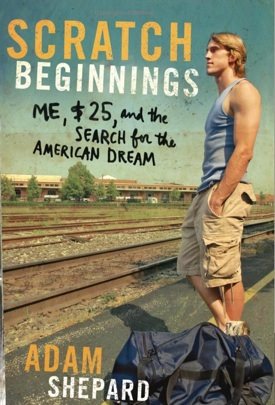Moreover, before reading the book, most of us thought that the people living in shelters would be bums who didn’t try to help themselves out of the situations, but it is not the case. Shepard saw both types of people at the shelter. There were people fell upon hard times and who were working to get their lives back on track. There were others who were satisfied by living there, and using their money to buy drugs, cigarettes or alcohol instead of saving money to move out on their own.
We all agreed on a point: he basically made up a story that was a necessary action to be accepted, but ethically, it was wrong. Plus, he could have offended some of the other residents of the shelter, especially those who he became friend with, because he didn’t tell the truth. They didn’t really know who he was. He chose to be in that situation whereas all the people he met throughout his experience didn’t. He could have easily gotten out of this status whenever he wanted. Although it was necessary for his experiment, it didn’t seem right to use services that are reserved for people who really need them. He got discounts on the bus fare, and received food stamps which takes away resources that other people in need could have used.
If we were only considering that Shepard’s exploration of the homeless subculture, he probably could have gathered a lot of information. Indeed, he could have done so by researching, interviewing, looking at statistics of homeless people’s employment rate and how often they return to the shelter. He could have looked for their statistics of income and if there is an increase or decrease throughout the year of residents at shelters. He could interview people that came from a bad background and made it big. However, since his ultimate goal was to prove if the American Dream was still a reality, his method choice was probably his best shot.
Shepard concludes saying that the United States of America is the best place for class mobility. He finds out that it is possible to make it from the bottom of the scale in American society. His goal was more to demonstrate that the American Dream is still alive and not only an illusion even we are in time of recession than exploring the subculture of homeless people. He totally succeeded on that point, since all the goals he had before the beginning of his experience were achieved in 6 months. Indeed, by that time, he already had a furnished apartment, a car, a job and more than $2,500 on his bank account. Some people discuss his success because of his background: he had no health problems, psychological disorders. Moreover, he was white and basically could not suffer from any discrimination. Even though those theses are approved by some people, Shepard’s experiment is still remarkable. If he had enough courage and envy to get out of his status whereas he was not in “real” danger – he could have given up his project and come back to his real life – we could expect people in “real” need to put even more effort in this process of social status raise and eventually search for the American Dream. It was successful. He did a case study where he was the case and showed that the American Dream is attainable




